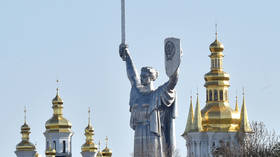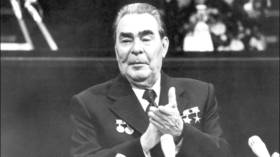
The Motherland Monument in the country’s capital will be called the Ukraine-Mother monument instead, a senior official has said

A view of the Motherland monument and the Kiev-Pechersk Lavra in Kiev on April 6, 2020. © Sergei SUPINSKY / AFP
Ukrainian authorities will rename the iconic Motherland Monument in Kiev as part of Kiev’s long-running push to sever cultural ties with Russia, a senior official said on Saturday. The statue celebrates the Soviet victory over Nazi Germany.
Speaking to local media, Yury Savchuk, director general of the National Museum of the History of Ukraine in WWII, which is responsible for the sculpture, revealed that the institution’s scientific council had made a “number of important decisions.”
“One of them was to rename the Motherland Monument to the ‘Ukraine-Mother’ monument,” he said, adding that he expects the move to be formally approved by the Ministry of Culture before the country’s Independence Day on August 24.
Without giving details of the deliberations, Savchuk portrayed the decision as a part of a more comprehensive process that he said would involve changing the monument’s Soviet coat of arms, renaming the statue and the museum itself in a bid to project a new overall image.

Read more
The 102-meter-high Motherland Monument, which towers over the Dnieper River, holds a 16-meter-long sword in its right hand and a shield emblazoned with the hammer and sickle, the Soviet coat of arms, in its left. Inaugurated in 1981 by Ukrainian-born Soviet leader Leonid Brezhnev, it is the fifth-tallest statue in the world and the tallest monument in the country.
The site escaped Ukraine’s infamous 2015 decommunization law, which banned Soviet-related symbols and led to the mass removal of monuments and the renaming of hundreds of places across the country as the legislation made an exception for WWII landmarks.
However, in May, Ukrainian Culture Minister Alexandr Tkachenko said Kiev planned to replace the Soviet coat of arms on the monument with a Ukrainian one, a golden trident. The Culture Ministry plans to have completed the overhaul by the end of August, and on Tuesday it released a video showing workers preparing to remove the hammer and sickle from the monument.




